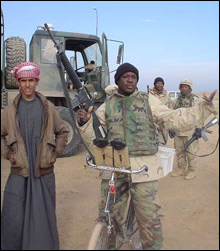Next time you put on the new Spoon single to make that subway ride go by a little faster, or turn up Gnarls Barkley on your iPod to drown out the background noise at the office, consider what musical escapism means to troops in Iraq.
Think of them blasting whatever CDs they can find from a shitty disc player (whose life expectancy in that desert sand is just a couple months). Think of the soldier from Worcester nursing his ration of two Budweisers, drowning in the sound of 50 Cent and Beyoncé as strobe lights flash in some Spartan military mess hall.
Think of the scenes in Michael Tucker and Petra Epperlein’s documentary Gunner Palace, which, for showing how life is lived in this war, should be mandatory viewing. Think of gonzo Specialist Stuart Wilf — wild-eyed, lanky in an Exhumed T-shirt, leaping around with guttural death-grind screams, strumming a tinny guitar, purposefully oblivious to the RPG making impact in the distance.
Think of Specialist Richmond Shaw, using freestyle verse to exorcise the demons of those dusty Baghdad blocks, describing the theater of war as “a place where the street lights never come on/And every time you step outside it’s like hearing a sad song.” Reminding the audience at home of one inescapable truth: “For y’all it’s just a show. But we live in this movie.”
From MRES to MTV
American military personnel use music as a way to dispel stress, to steel their nerves for dangerous missions, to give voice to their fears and frustrations. They also find themselves filling the longueurs of endless, deadening downtime with awful TV, cheesy music videos from Europe and the Mideast, and whatever movies — good or bad — they can get their hands on. (One soldier I spoke with says he “watched O Brother, Where Art Thou? about 27,000 times.”)
As fascinating as it is to speak to US military personnel about the ways pop culture manifests itself in Mesopotamia, it’s doubly interesting to examine how veterans’ tastes have changed upon their return to the States. So many stories about veterans are told from political angles, or focus on financial questions, or health care. Few examine how mass media are used as coping mechanisms over there, and back here. But that’s exactly what happens.
Enlisted men and women ship off to fight and return home utterly changed. They are witness to unspeakable acts abroad that we can only barely comprehend. It can’t be easy to transition back from the land of IEDs and MREs to the land of iTunes and MTV. What does it feel like to depose a dictator then return to a country where Britney and Lindsay rule the news?
Not good, says Marine Randy Cornejo, 26. “It’s crap. When you got little things making big news, when Paris Hilton’s getting as much coverage as when the towers went down, something’s wrong.”
Some troops have become hardened back home. The music they listen to seems devoid of substance, the clubs they haunt soulless. While some use certain songs or movies to remember their wartime experiences, others are just trying to forget, and need music to calm their nerves, to fall asleep. Still others are using music and images and words to relay the essential existential experience of soldiers in Iraq — and to work through their own conflicted feelings as they do.

SHOT FROM THE WAR: ex–National Guardsman and Worcester hip-hop producer Denoh Grear |
Sand and the city
Asked if a particular song captured the experience of the early days of Operation Iraqi Freedom, Abe Cho, 24, of Allston-Brighton, hardly hesitates. “Bodies.” That thunderous, percussive anthem by nu-metal mooks Drowning Pool.Immediately after 9/11, the song — with its screaming refrain, “Let the bodies hit the floor!” — was on Clear Channel’s infamous “Songs of Questionable Content” list, banned from the media behemoth’s stations for weeks. But in Iraq, violent music was made to order. “I remember being in a tank battalion and they would hook that up to the com helmets,” he says. “It just goes so well. It builds up so slow and then gets really intense.”
And it serves as a handy soundtrack to real-time death, mediated by technology. “The lyrics are what you’re seeing,” says Cho. “When you’re in a tank, using thermal IR, all you see are little white dots that kind of appear like bodies. And inside the tank, you kind of hear the main gunfire. So it almost looks like a video game. That’s what you’re thinking when you’re shooting.”
(Cho offers another chilling glimpse inside the turret. “They teach you when you press the trigger, to say ‘Die, motherfucker, die.’ The time it takes for you to say that phrase is the length of an eight-to-10 round burst.”)
Cho had enlisted in the Marines when he was a high-school student on Long Island. He joined and completed infantry training in a pre-9/11 world. “I distinctly remember being stationed out in California and thinking, ‘It’s gonna be okay, I only have two or three years left,’ ” he says. “But September 11, that’s when everything changed.”